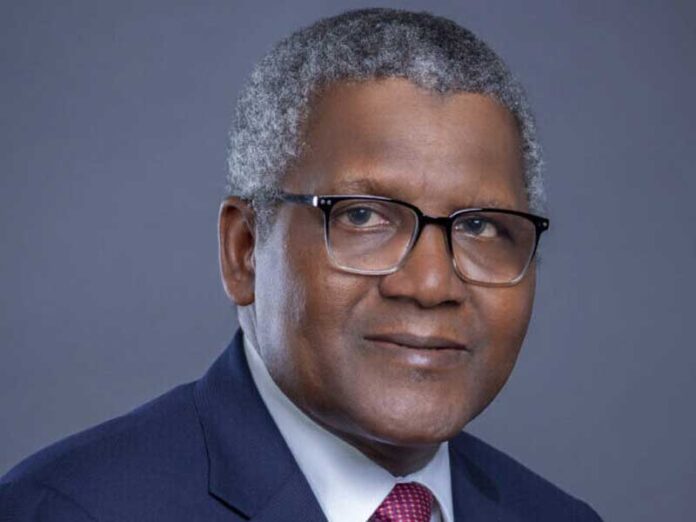Set to flood market with petrol, Aliko says electric cars, renewable energy not threat to Dangote Refinery
CHIGOZIE AMADI
Africa’s richest man and President Dangote Group, Alhaji Aliko Dangote, has said the proposed transition to electric vehicles, achieving net zero fossils and an end to sale of new petrol and diesel cars by European countries would not negatively impact the $19.5billion Dangote Petroleum Refinery, revealing that about 6000 derivatives are produced from fossil fuel.
According to him, the fact that over 600million Africans currently lack access to power supply implies that demand for fuel especially on the continent will continue to increase in years ahead notwithstanding a successful switch to renewable energy.
Venturing into the gigantic project he explained, was informed by determination to leave a legacy of self-sufficiency in petroleum products, as well as create direct and indirect jobs through industrialization and prosperity in Nigeria.
He disclosed this at a media parley and tour of the Dangote Petroleum Refinery and Petrochemicals in the Ibeju Lekki local government area of Lagos state on Sunday.
“ I don’t have any fear that there will be drop in demand for petroleum products in the near future. Even the United Kingdom has extended the deadline to end the sale of new petrol and diesel cars till 2035, and there are some key outstanding issues.
“Like I explained before, new petroleum refineries are not being built and even some European countries are still using coal to generate power contrary to earlier impression that they don’t need the solid mineral.
“My determination is to use our natural resources for our industrial growth and prosperity for the people”, he declared, adding that no stone will be left unturned by management of the refinery in ensuring its regular turn around maintenance every four or five years.
Revealing that only eight percent of Nigeria’s arable land is under cultivation, the billionaire said the country has no business with food importation, stressing that the government should focus more to encourage domestic investment in agriculture and other sectors to create jobs, boost food production and create wealth for citizens
He said the nation’s reliance on imported products is tantamount to importing poverty into the country and creating jobs and prosperity in the exporting nations, noting that he was into the importation of goods for over 20 years.
On the uniqueness of the multi billion dollars project, the business mogul revealed that it has its own dedicated steam and power generation system with adequate standby units for reliable and uninterrupted utility supply to operating plants.
“It has a 435megawatts power plant that can meet the total power requirement of Ibadan Distribution Company covering five states namely: Oyo, Ogun, Osun, Kwara and Ekiti. Dangote is one of the few companies in the world executing a Petroleum Refinery and a Petrochemical complex directly as an Engineering, Procurement and Construction (EPC) Contractor”, he stated.
Highlighting the benefits of the Refinery to the nation’s development, Dangote pointed out that “it is estimated to generate an annual market value of $21billion for Nigerian crude oil” as well as foreign exchange savings/earnings of $9.9billion.
He said 56percent of the production would be exported with a foreign exchange generation of approximately $17billion and ensures over $25billion addition to the Gross Domestic Product, GDP, through massive value addition within the country.
Furthermore, he said products from the plant would “serve as raw materials for the production of polyvinyl chloride (PVC), which is used extensively across a broad range of industrial technical and everyday applications including widespread use in building, transport, packaging, electrical/electronic and healthcare application”.
Dangote says Company’s projected $30bn revenue will boost the Naira value
Meanwhile, Aliko Dangote, has stated that his company’s aim is to become the leading supplier of foreign exchange in the FX market soon, as it targets $30 billion in revenues by the year 2025.
During a tour of the Dangote Petroleum Refinery & Petrochemicals and Dangote Fertiliser Limited with media executives at the weekend, he said the plan is to attain independence from the Central Bank of Nigeria (CBN) in forex sourcing, highlighting a strategic shift in revenue composition within the cement business from the current 75 percent to 15 percent in the future.
The expected significant inflow of forex into Nigeria through his businesses, will automatically boosts the value of our local currency and make Naira regain its value in the comity of international currencies all over the world.
According to Dangote, the refinery began full operations in 2024, initially focusing on refining intermediate products such as polypropylene, naphtha, RCO, gasoline, diesel, and jet fuel.
He explained that the refinery entered its steady-state production phase in March 2024. Additionally, he anticipates production ramping up to 500,000 barrels per day (bpd) with 15 crude cargoes per month by August, increasing to 550,000 bpd by the end of the year, and aiming for 650,000 bpd by the first quarter of 2025.
“Petrol production is to commence in July with sales from August,” assured Dangote.
Dangote also hinted that the group intends to list both Dangote Petroleum Refinery & Petrochemicals and Dangote Fertilizer Limited on the Nigerian Exchange Group in the first quarter of 2025.
He said that this initiative would enable Nigerians to participate in the ownership of these companies.
“Due to the nature of our business with both the refinery and the fertilizer, we are aiming to list them by the end of this year. However, depending on circumstances, worst-case scenario, we anticipate listing them before the end of the first quarter of next year. This will allow us to offer shares for sale and enable Nigerians to participate as shareholders,” Dangote stated.
The Dangote Refinery, which will process 650,000 barrels per day (BPD) at full capacity, stands as Africa’s largest oil refinery and the world’s largest single-train facility, while the Dangote Fertiliser Limited operates Africa’s largest Granulated Urea Fertiliser complex. Presently, Dangote Cement is Nigeria’s most capitalised company.
While noting that the total storage capacity of the refinery is 4.5 billion litres, sufficient to cover 20 days of Nigeria’s crude requirement and store products equivalent to 15 days of Nigeria’s petrol consumption, he stressed that the refinery would produce 53 million litres of petrol per day and 1.1 million tonnes per day.
He added that the refinery is equipped with dedicated loading gantries featuring 86 loading bays, alongside specialized marine facilities for the offloading of crude and the loading of petroleum products. Additionally, the facility, he said, includes a 900-kilotonne per annum polypropylene plant, with production capacities of 36,000 tonnes per annum for sulphur and 585,000 tonnes per annum for carbon black.
Dangote said that over the past four decades, the operations of Dangote Group have evolved significantly from a commodity trading company to a diversified conglomerate.
He emphasised that this transformation was driven by the overarching goal of achieving self-sufficiency in key sectors and bolstering Nigeria’s economy.
He noted that the group, which began as a trading company in 1978, has expanded into a diversified conglomerate with investments spanning cement, agriculture, fertilizer, petrochemicals, oil & gas, auto assembly, infrastructure, and other sectors.
He said the group is driven by the idea that Africa’s future prosperity hinges on its ability to harness its own resources and capabilities. Dangote stressed that the continent inadvertently imports poverty and exports jobs by exporting raw materials and importing finished goods.
The Vice President, Oil and Gas, Dangote Industries Limited, Devakumar Edwin, reiterated the commitment of the company in enhancing local capacity in critical sectors of the economy.
He said Dangote Industries Limited has empowered young Nigerians to assume key roles across its operations, with many even becoming expatriates in other nations.
Edwin stressed the refinery’s status as the world’s largest single train complex constructed entirely by a Nigerian company, highlighting a significant achievement in local engineering and construction capabilities.
Noting that most refineries were built by foreign companies, he said it is a thing of pride that a Nigerian company, acting directly as Engineering, Procurement, and Construction (EPC) contractor, designed and built the world’s largest single train refinery complex.
He said this has enhanced the capacity of many Nigerians involved in the process and that a Nigerian company can build a refinery anywhere in the world.
“It is a thing of pride that the largest single train refinery in the world is 100% designed, engineered, and constructed by a Nigerian company as EPC contractor,” he said.
While expressing gratitude to the media executives, Group Executive Director of Commercial Operations at Dangote Industries Limited, Fatima Aliko-Dangote, reiterated the company’s dedication to creating a positive impact on the economy.
She commended Aliko Dangote’s steadfast commitment to advancing the continent’s development.
“He (Dangote) is committed to ensuring the success of Nigeria and Africa as a nation and a continent. Our focus extends beyond profit to solving problems and achieving self-sufficiency across all sectors in Africa. By meeting global standards, we have positioned ourselves to export our products to every continent in the world,” she said.
Fatima pointed out that the group is not only the largest private employer of labour but also consistently ranks as one of the top taxpayers in the country each year, adhering to all relevant tax laws and regulations.
“We are known as one of the largest employers of labour. However, we are also conscious of ensuring our workers enjoy a good living standard. This is reflected in our inclusion in the list of top paying firms in the country. Our impact on employment generation extends to creating thousands of indirect jobs in the various communities that we operate in,” she added.

























